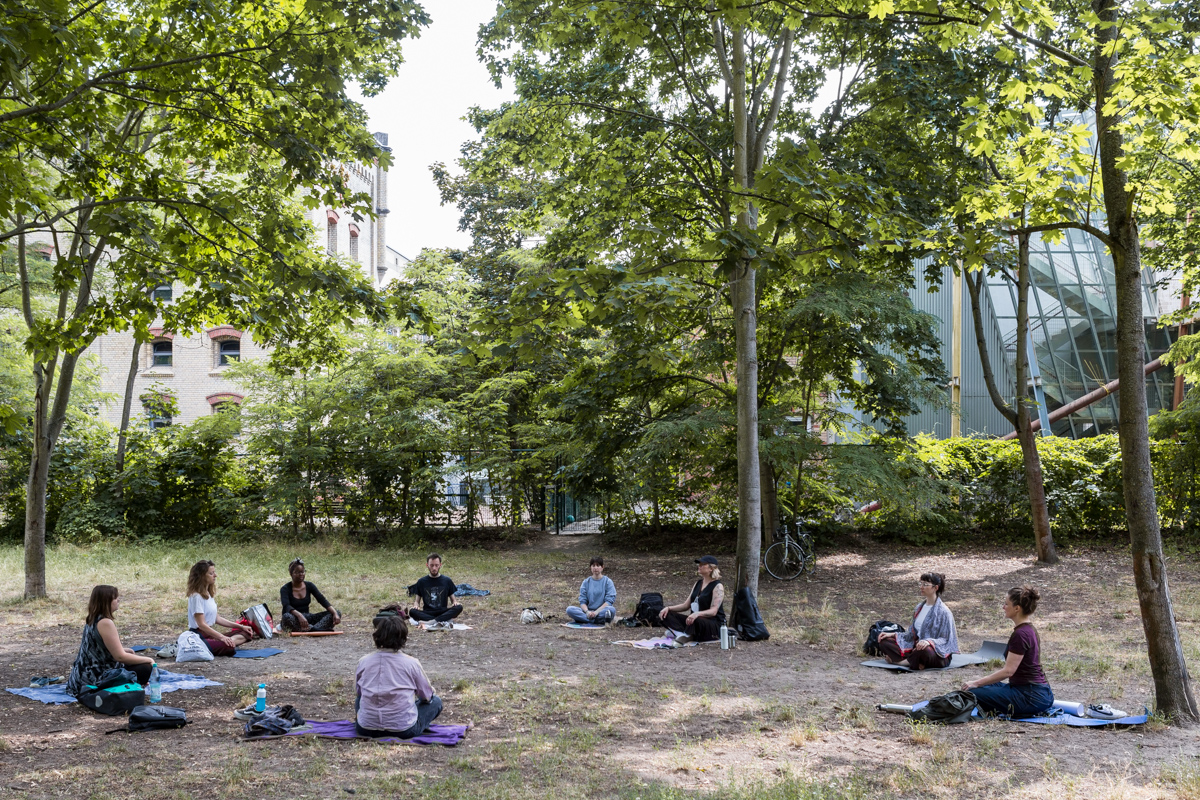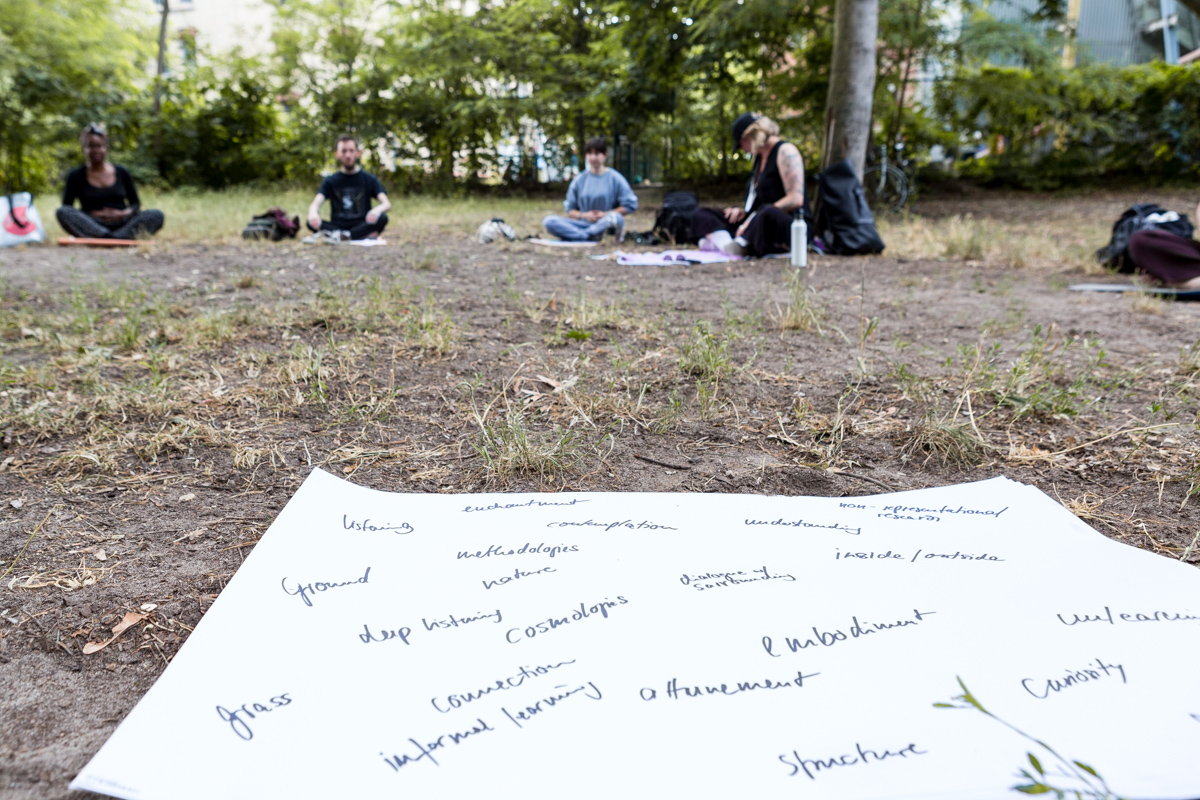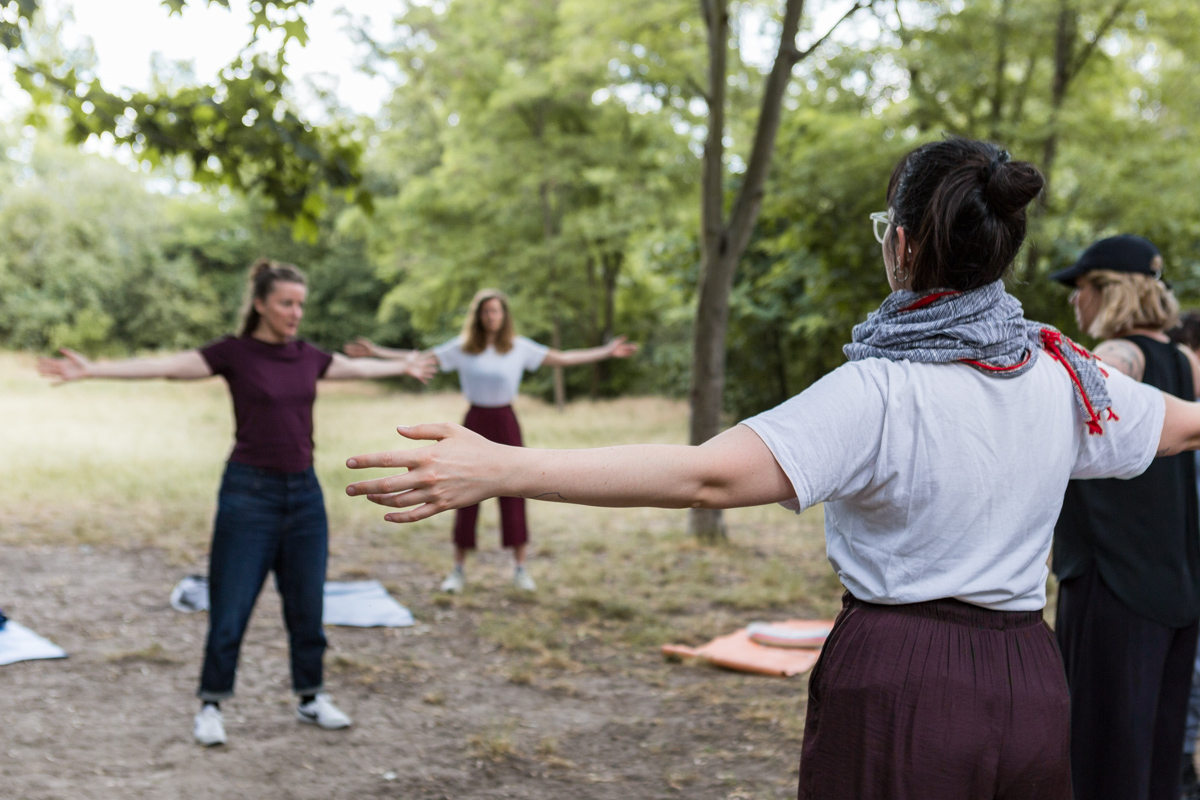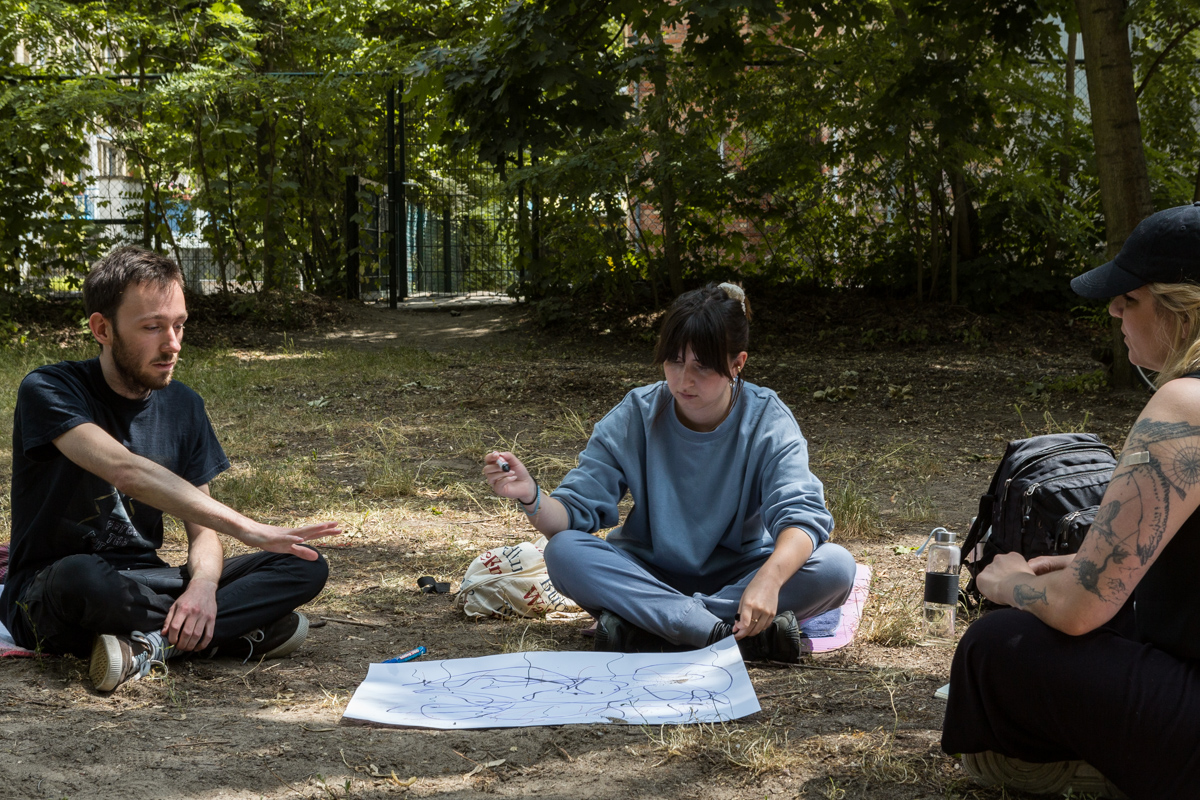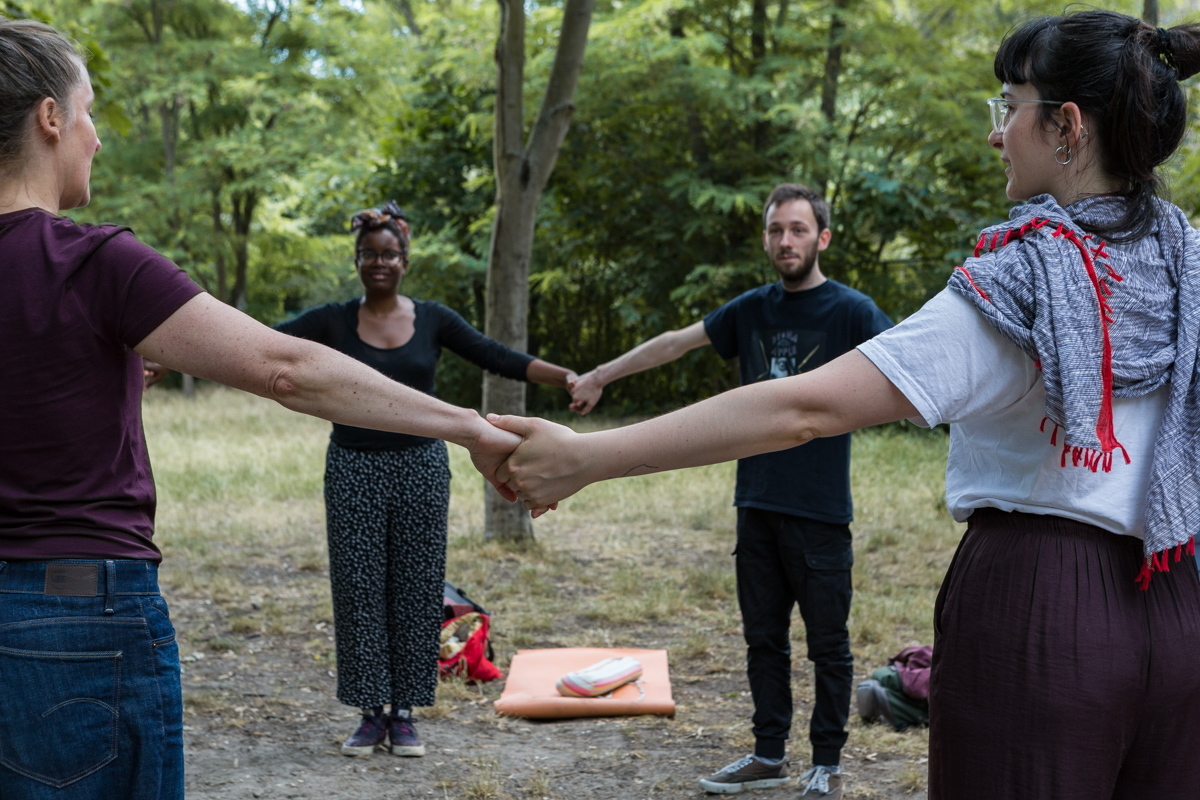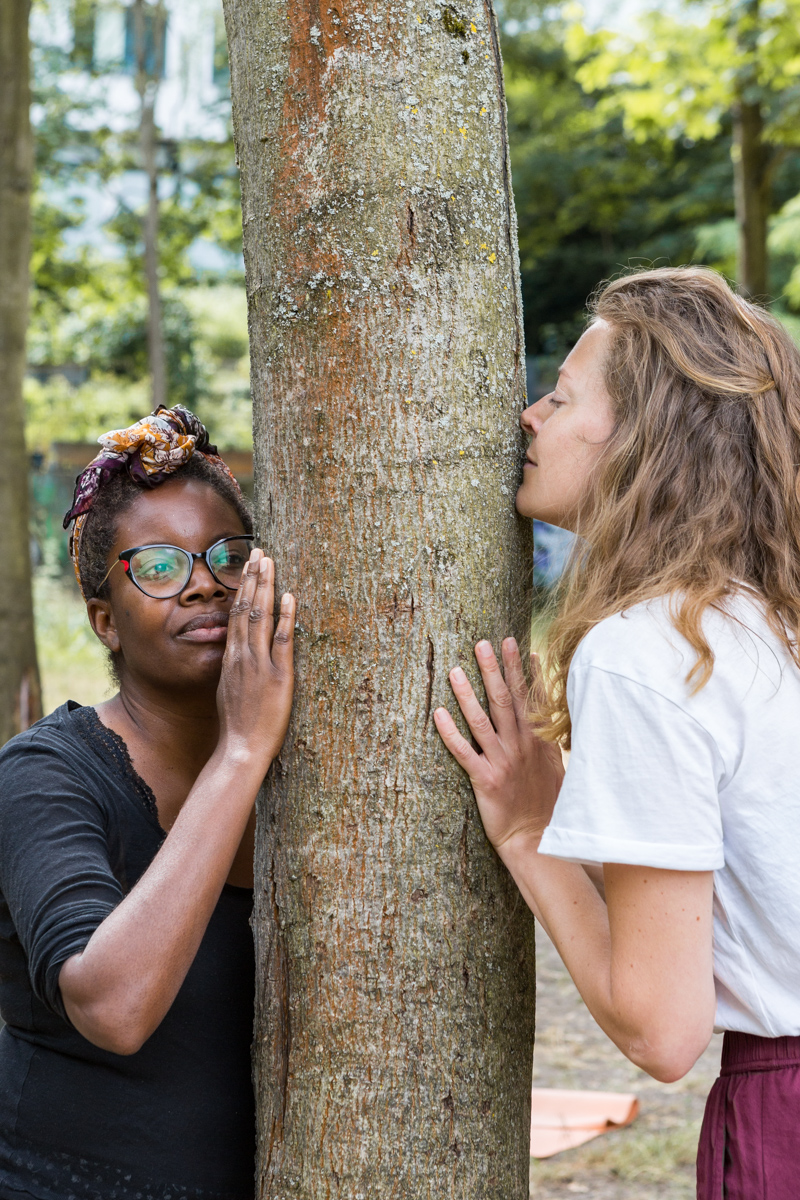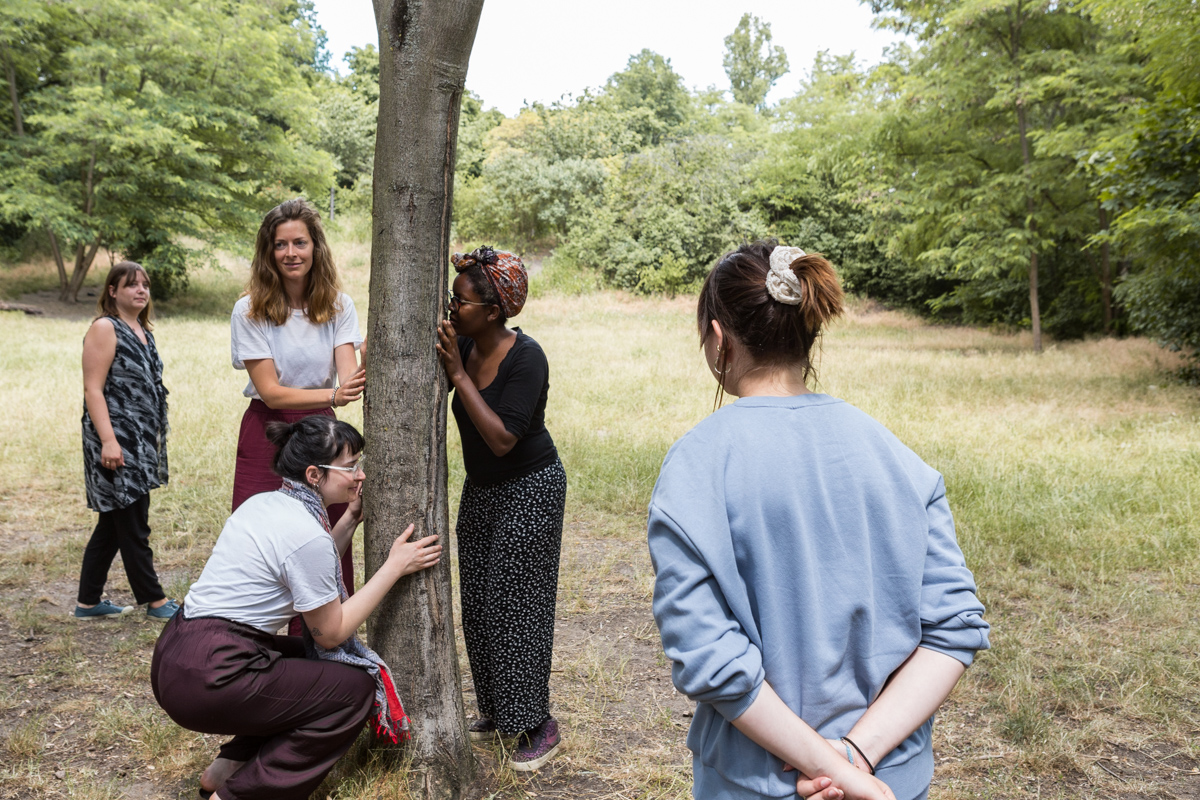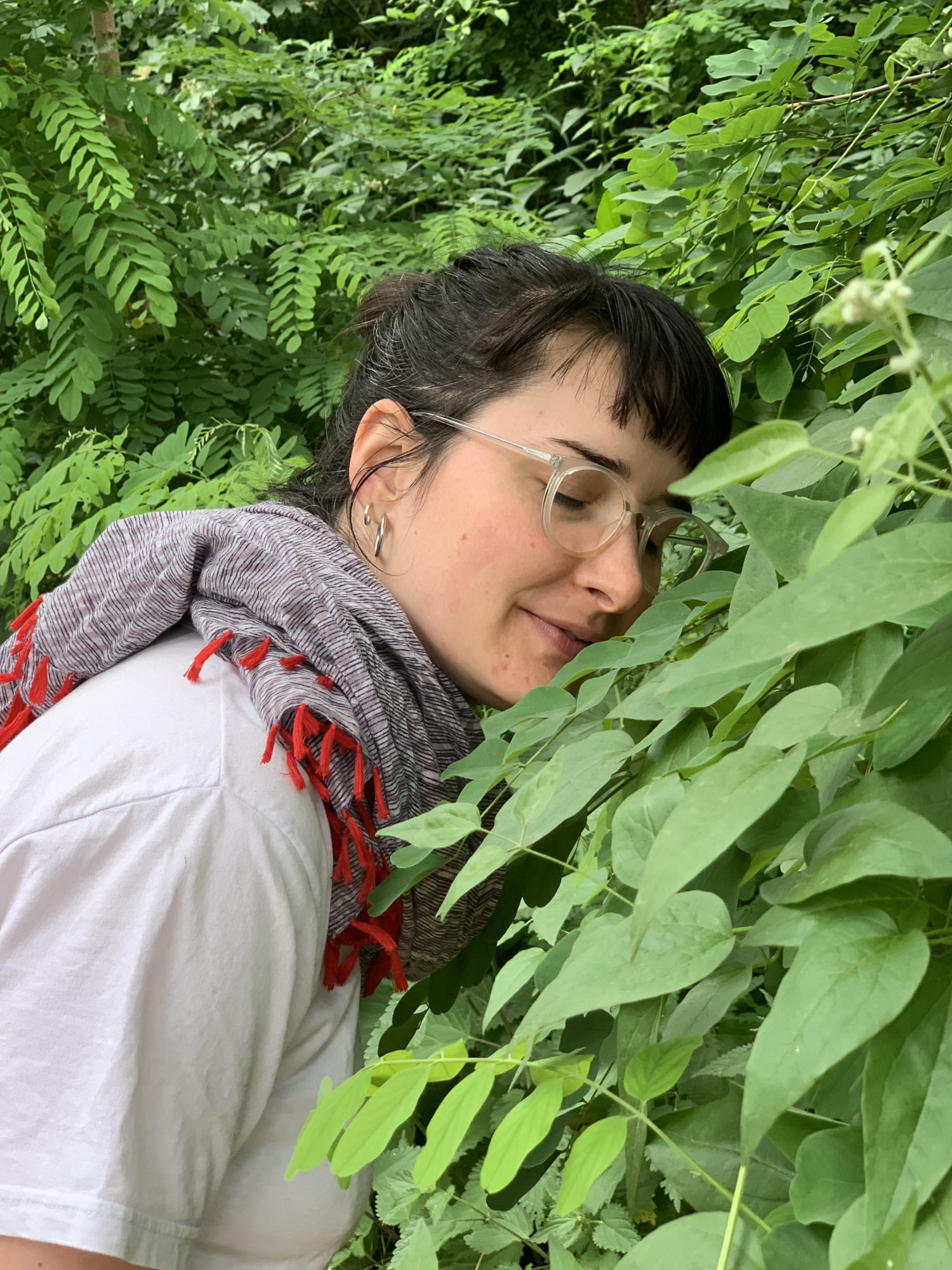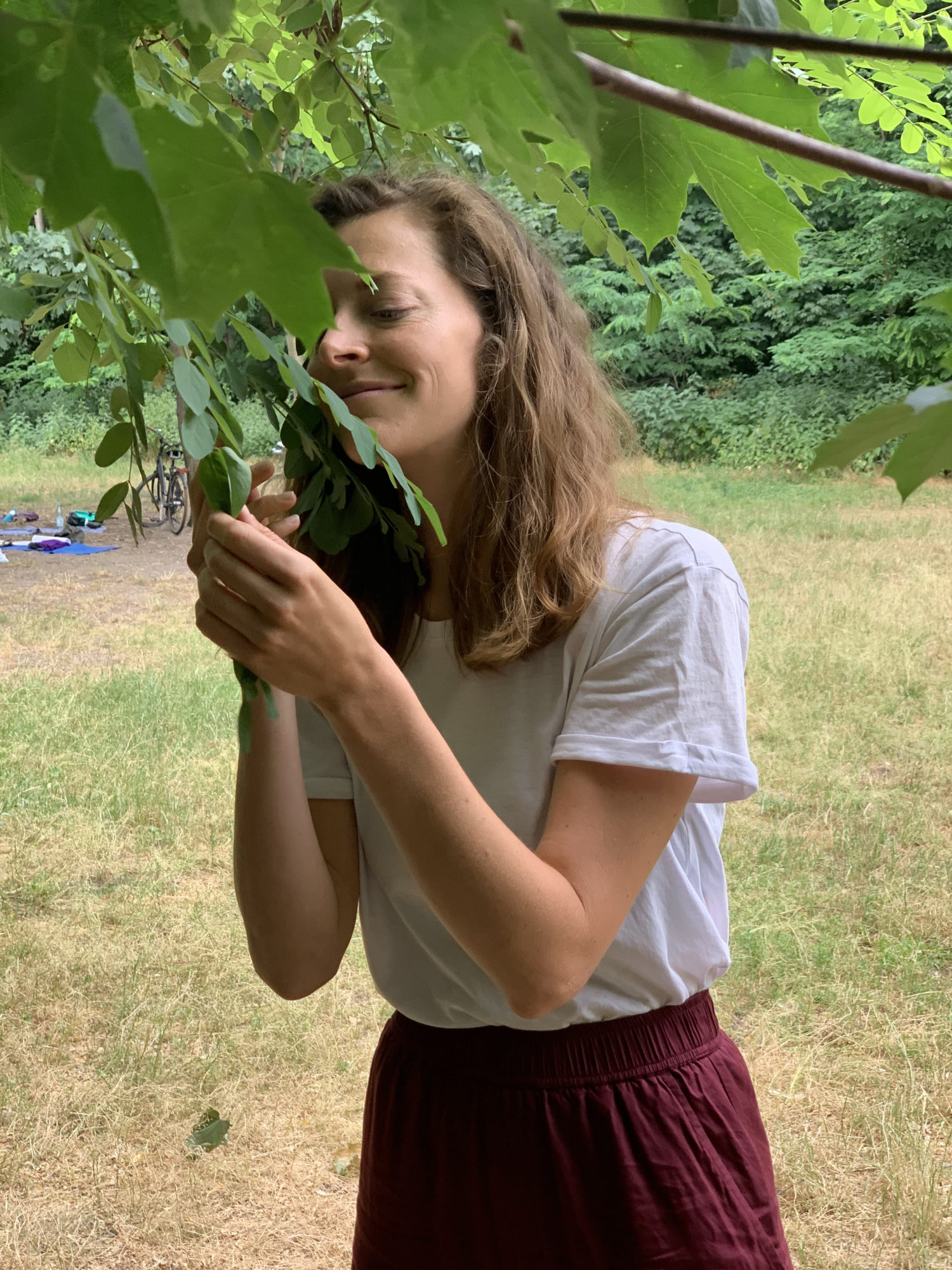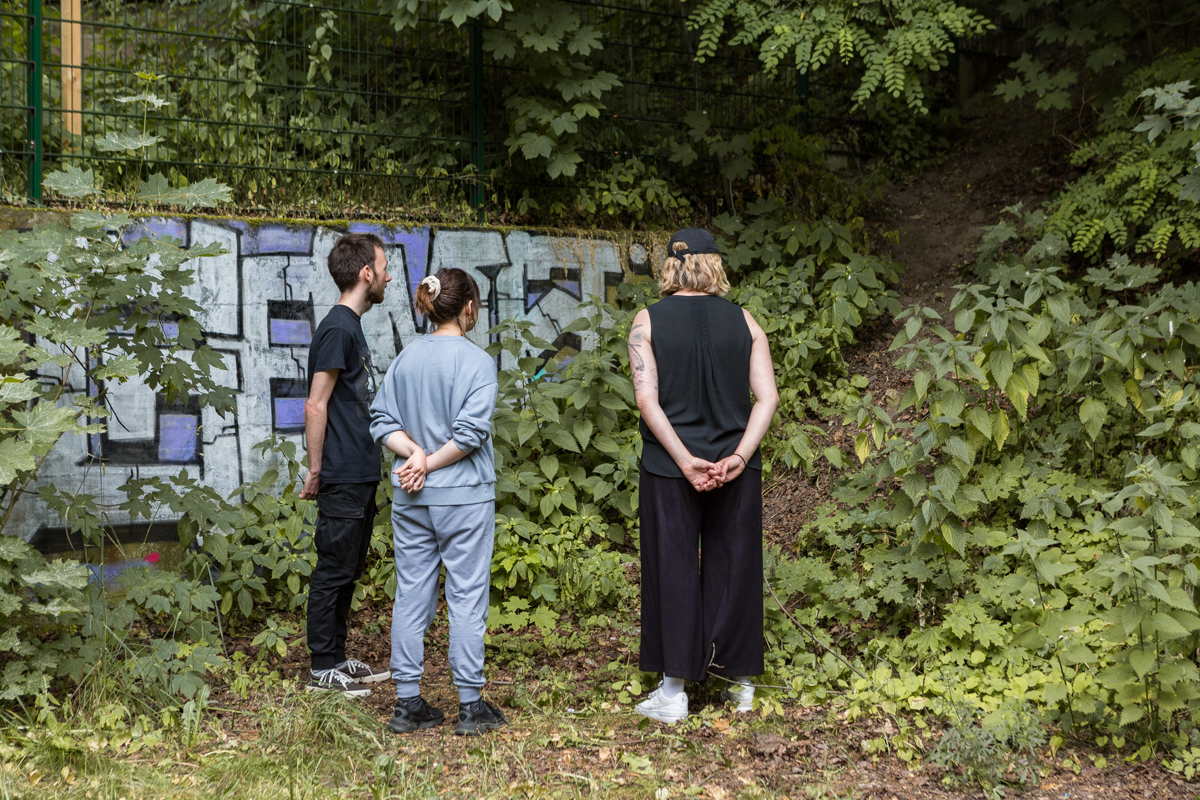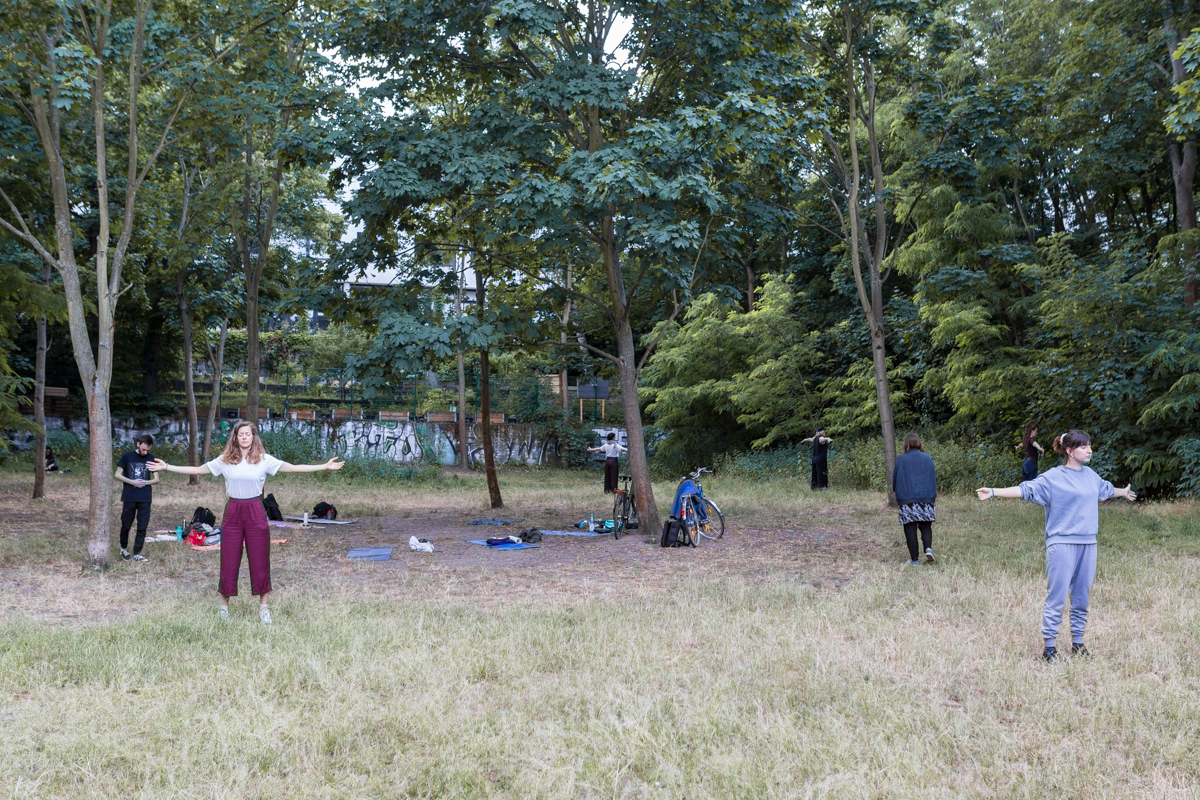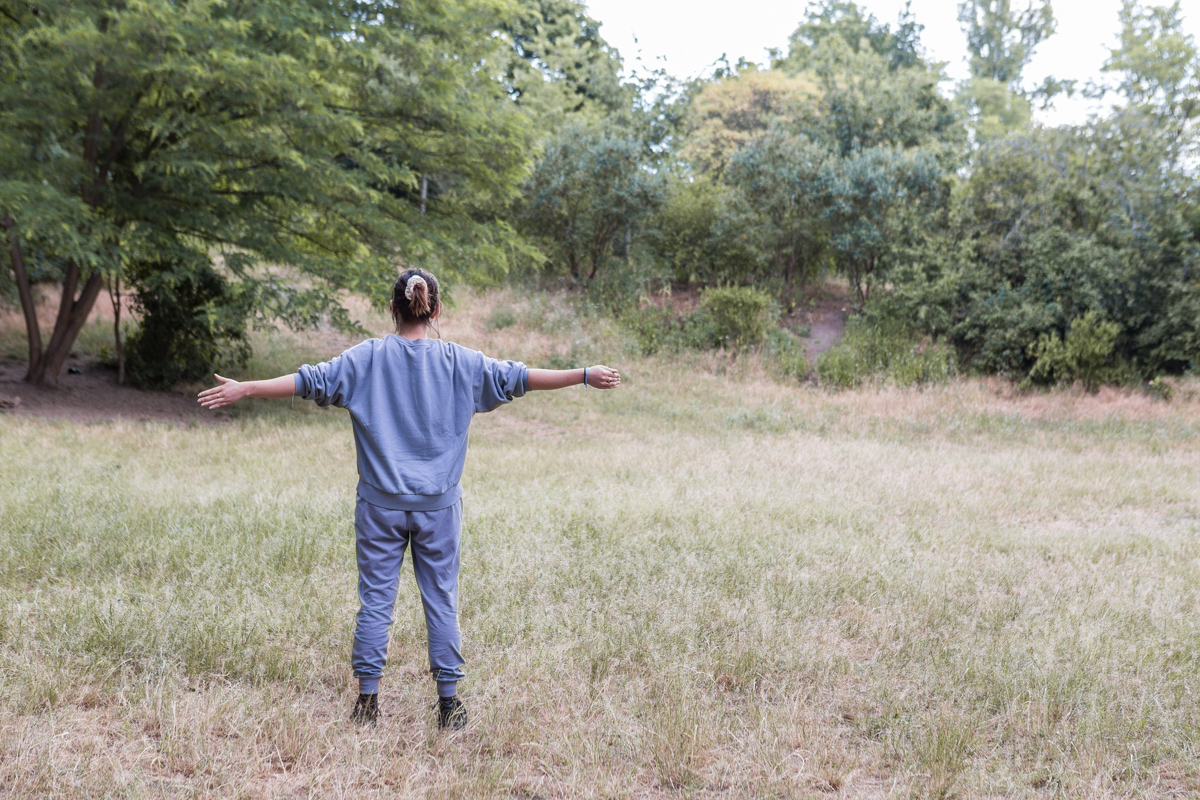Feminist Instituting for Ecological Futures
An affective encounter at Hasenheide Park, Berlin on June 25th, 2021
Debates and pursuits for institutional critique, institutions of critique and a “new institutionalism”[1] have existed since the 1970s. Questions of how to overcome institutional structural power relations, internalised rules and norms, the understanding of a work of art as a mere object and the whole institutional framework that comes with it, have been some of the central questions in these deliberations. How does one achieve an emancipated institutionalism that moves beyond the demands of the neoliberal event economy and seeks a profound structural change away from a criticality about something, and rather towards an activated, embodied, and experiential critique?[2] Can a move away from a static institutionalism be imagined, towards an active and processual “instituting”? A striving towards a non-gendered and ecological “feminist instituting”?
“Feminist instituting” I like to understand as a social ecology, a collective agreement and cooperation; an incomplete and continuous process of becoming, of endlessly changing social interactions and improvisations. Ecology is perceived as the entangled relation of all living organisms to one another and to their physical surroundings – including the social and human organism that is a complex multispecies synthesis in itself. An instituting that lies within feminist epistemologies and ontologies of “in-corpo-rating” an experiential, unmediated and embodied shifting of critical thinking towards new directions that might resist and challenge dominant and institutionalised narratives. A feminist instituting that understands the micro level and the body as a sites of practice, of becoming and of potentiality; as the starting point for what Brazilian curator, writer, and psychoanalyst Suely Rolnik calls “active micropolitics”[3] and for, what I refer to as, “embodied critique”.
Spanish philosopher Marina Garcés offers thinking on embodied critique as an advance away from the “artist-intellectual” and from techniques of critique about the world: “To embody critique means to ask how to subvert one’s life nowadays in such a way that the world can no longer remain the same.”[4] An embodied critique to overcome what she calls the “impotence” that has been caused by neoliberal, late-capitalism’s micropolitical manipulations, its changing of social relations and capacities of connecting:
No one is sure of where they are: connections, personal and non-transferable, are inseparable from the threat of dis-connection. For this reason, this new social contract converts us into producers and reproducers of reality, in knots that strengthen the network: established unilaterally through each person. This network obligates through self-obligation, controls through self-control, represses through self-repression.[5]
This “social contract” is driven by neoliberal capitalist’s deferral of systemic responsibility to, for example, that of individual problem-solving, and is based on the logic of separationism that demands self-commodification and self-representation (a logic of exteriority that is engraved e.g., by social media). Spectatorship, observation, by-standing and the outside view are qualities that today’s society is abundantly saturated with, and that enhance the efforts of late cognitive and data capitalists to construct hyper individualism, separation, apathy, and emotional states that manipulate and alienate subjects from their own social and expressive efforts. A fertile ground to nourish post-truth narratives, symbolic violence, populist, right-wing, identarian, racist, sexist, and nationalist trends.
Humanity lives in a time of precarity; in precarious planetary and social existence that is governed by the rationale of power-seeking, exploitative neo-liberal, technocratic capitalism and its global commodification of life and nature. Not least the present Covid-19 Zoonosis reveals the delicate vulnerabilities and deeply interwoven interdependencies of humanity and its co-existence within the community of life.
This precarious and highly charged political climate cries out for a fundamental cultural, socio- and eco-political shift that redefines the very nature of relationships with the Other – human and the non-human world alike.[6] Such a reorientation encompasses the need for profound ontological and epistemological changes in cultural practices and in forms of instituting: moving away from reactionary passive consumerism and spectatorship; away from “neck up” disembodied perception and critique about the world.
Instead, a shift in instituting, in social and ecological agreements, is needed. A shift towards a cultural formation of knowledge that can mobilise and activate the theories and issues at stake, and that takes a holistic, a body and mind activating and experiential consciousness-raising to heart. One that might be termed as feminist instituting. One that embraces practices of trans-disciplinarity, embodiment, and situatedness to engender profound structural and ontological change in the social relations that enable “instituting”. An epistemology and an ethics that calls for a knowing and being not about, but with the world; that expands beyond closed margins of the “self”, that disrupts limiting binaries and fosters a sharing and openness for pluriversal and polyvocal viewpoints as well as a holistic experiential criticality.
I turn to foundational non-gendered feminist pedagogies, epistemologies, cosmologies, and practices that strive to connect theory to lived experience. Approaches that question heteronormative ways of knowing that are based on disembodied objectivity, and that are anchored predominantly in a Cartesian rationalist, metrics-driven objectivity, and neutrality. For the affective encounters that I facilitate I often engage with intellectual thinkers whose teachings recognise the urgency for multiple ways of knowing and being. They are vital inspirations in the pursuit of a feminist instituting that questions dominant representations, and that challenges capitalist logics, heteronormativity, racism, populism and colonialism. Practices towards a decolonisation of the subject (and the natural world). Decolonisation is understood here as a phenomenological approach, in the sense of delinking from capitalistic appropriations in the process of subjectivation and to overcome and challenge hierarchical and binary realities of Othering and otherness. Portuguese Sociologist and legal scholar Boaventura de Sousa Santos comments on the notion of colonialism as follows:
Colonialism did not end with the historical end of territorial occupation. Only its form changed. […] Likewise, the term “decolonization” does not concern political independence alone, but rather an ample historical process of ontological restoration, that is, the recognition of knowledges and reconstruction of humanity.[7]
THE AFFECTIVE ENCOUNTER
In this affective encounter conceived for the New Alphabet School’s #Instituting edition we rehearsed a Feminist Instituting for Ecological Futures by submersing ourselves into the search for hybrid alternative epistemological (re-)imaginations – moving away from a knowing about, towards a “knowing with” (de Sousa Santos) or a “worlding with” (Haraway).
Colombian philosopher Juan Cepeda H. reminds us of non-Cartesian Indigenous ancestral epistemologies and cosmologies that hold a different approach to knowing with:
We must learn to listen.
We must learn to feel.
To feel:
the soul of things,
the touch of words, the pace of essence, the symphony of the total Being.[8]
A kind of “feel-thinking”, ways of knowing and being that are rooted in thinking with both heart and mind. A holistic thinking that does not separate the mind from the body, or emotion from reason. An empathic knowledge formation that is in reciprocal intertwinement between learning and acting; a knowledge formation that by learning acts and that by acting learns. A conscious awareness of being interconnected with all living beings.
In her work on decolonisation from dominant Anglo-American philosophy and patriarchal hegemonic power structures, the queer Chicanx scholar, poet, writer, and postcolonial feminist theorist Gloria Anzaldúa (1942-2004) proposes a “mestiza consciousness”; a tapping into the feminine spirit for dissolving established binary and divergent patterns in ways of thinking, for a non-separationist and inclusive perspective.[9] Anzaldúa’s perspective is borrowed as an expanded notion beyond her particular focus on gender and racial norms, as a philosophical approach that invites tolerance for ambiguity, for contradiction, for an openness to deconstruction of rationality, for silencing the analytical and for opening up more ambiguous ways of reasoning. “An openness to openness, an openness that does not move towards a conclusion or a resolution.”[10]
In this three hour long affective experiential encounter we neither endeavoured to find conclusions nor resolutions, but we strove towards being in full presence and “in enchantment” with what commonly might be considered “an ordinary” present moment. I refer here to political theorist and philosopher Jane Bennett as a vital voice in the interdisciplinary conversation about deep connections between ethics, aesthetics, and politics. She argues for what she calls an “ethical generosity,” the cultivation to build an emotional energy towards the unusual, captivating, disturbing, being struck by the extraordinary amid the familiar in everyday life.[11] To regenerate and rehabilitate enchantment and experience of genuine wonder; a love of life which holds the potential to motivate ethical behaviour.
Hasenheide Park in Berlin-Kreuzberg – with all its idiosyncratic coexistences in a shared public space – was the setting of this experiment to tune into genuine wonder and into the full presence of a being with. A being that embraces the body as a rightful ally in the formation of knowledge. The body as relation plays a vital rolewithin the incomplete and continuous process of becoming and ever-changing social interactions and improvisations in the ways of instituting. The body is here acknowledged as an event, “moved and modulated by the polarity between earth and sky”[12], an open entity, involving a constant process of becoming that is composed by relation and by affectively encountering the Other. The encounter suggested a shift away from the busy and loud exteriority like that of (self-)representation, towards a reposeful interiority, a sensual micro-cosmic contemplation and awareness towards “enchantment”; towards a micropolitical becoming. A potential empowerment for engaging in the macropolitical scheme of things.
Within the temporary micro-community, we practiced a non-gendered feminist instituting and a social ecology. We rehearsed an incomplete and continuous process of becoming, collective agreements, cooperation, and improvisations that moreover extended the social to the ecological being with, embracing some of the surrounding living beings of the park into the process. We consciously located and tuned ourselves to the resonance of place. We moved through sensing and walking meditations, breath work and immersed ourselves into situated listening exercises. Some of them were inspired by experimental composer, performer, and humanitarian Pauline Oliveros’ (1932–2016) Deep Listening.
Deep Listening is an inclusive and embodied practice that amplifies the sense of place and presence through listening. It stimulates sonic consciousness, both externally and internally, and encourages experimentation, improvisation, collaboration, joyfulness, and personal and community growth.[13] While listening, a mutual space is produced, that brings together and bridges the internal and external worlds. Listening is the making of a common space and a methodology for consciousness raising and stimulating the awareness for interconnectivity to one’s environment and the social body.
For the duration of the three hours together, we submerged into collective affectivity, togetherness, into co-listening, co-thinking, co-sensing, co-wondering, co- and re-feeling and interconnecting. A feminist instituting encounter that hopefully became a temporary place of practice and of holistic change in perspective to rehearse for ecological futures – with an “openness to openness, an openness that does not move towards a conclusion or a resolution.”
Workshop participants:
Tinatin Gurgenidze, Verena Kittel, Louis Ratzel, Lotta Schaefer, Alison Sperling, Eleonora Toniolo, Viktoria von Pidoll, Ekua Yankah
[1] Ekeberg, Jonas (ed.) (2003), New Institutionalism, Verksted #1, Oslo: Office for Contemporary Art Norway, 2003.
[2] This text is based on Fischer, Berit (2021), “Mestiza Consciousness and Sentipensamiento – Ontologies for a Feminist Instituting” in: Helena Reckitt, Dorothee Richter (eds.), Instituting Feminism, oncurating , Issue 52, www.oncurating.org.
[3] Rolnik, Suely (2015), “Thinking from the Knowing-Body. A Micropolitics to Resist the Colonial-Capitalist Unconscious”. Presented at the conference: Turning (to) Archive. Institutional Histories, Educational Regimes, Artistic Practices and Politics of Remembrance, Academy of Fine Arts Vienna, Austria, April 2015.
[4] Garcés, Marina (2009), To Embody Critique: Some Theses, Some Examples, in: Raunig, Gerald and Ray, Gene (eds.), Art and Contemporary Critical Practice: Reinventing Institutional Critique, London: MayFly Books, 2009, pp. 203-210, p. 203.
[5] Ibid, p. 204.
[6] Introducing the ‘Other’ written in upper case, offers an additional subtext and layer of reflection that embraces the notion of Otherness and Othering. The intellectual history and concept of Otherness is a massive field of enquiry which cannot be elaborated further in the scope of this article.
[7] Boaventura de Sousa Santos, The End of the Cognitive Empire, The Coming of Age of Epistemologies of the South (Durham: Duke University Press, 2018), p. 109.
[8] Juan Cepeda H., “The Problem of Being in Latin America: Approaching the Latin American Ontological sentipensar,” Journal of World Philosophies 2 (Summer 2017), p.24.
[9] Her most prominent book is Borderlands/La Frontera, San Francisco, CA: Aunt Lute Books, first edition published 1987.
[10] Duarte, Eduardo (2018), The Dawn of Latin American Philosophy, lecture, Hofstra University, Spring 2018, LACS Synthesis Lecture 2: Cepeda’s Latin American Ontological Sentipensar. Available at https://soundcloud.com/user2603690/duarte-lacs-synthesis-2, last accessed 12 January 2021.
[11] Bennett, Jane (2001). The enchantment of Modern Life, Princeton and Oxford: Princeton University Press.
[12] Carla Bottiglieri, “Bodily Semblances, Temporary Dwellings: Somatic Moulding of Spaces and Subjectivities,”trans. Manuela Zechner, Carla Bottiglieri, Brent Waterhouse,in The Nanopolitics Handbook, eds. Nanopolitics Group (Paolo Plotegher, Manuela Zechner and Bue Rübner Hansen) (Wivenhoe, New York, Port Watson: Minor Compositions, 2014), p. 122.
[13] See, for example, https://www.deeplistening.rpi.edu.
Bibliography
Anzaldúa, Gloria (1999) “La Consciencia De La Mestiza,” in: Anzaldúa, Gloria, Borderlands/La Frontera, San Francisco, CA: Aunt Lute Books, 1999, 2nd edition.
Bennett, Jane (2001) The enchantment of Modern Life, Princeton, and Oxford: Princeton University Press.
Bottiglieri, Carla (2013), “Bodily Semblances, Temporary Dwellings: Somatic Moulding of Spaces and Subjectivities,”translated from French by Manuela Zechner, Carla Bottiglieri, Brent Waterhouse,in:Nanopolitics Group (Paolo Plotegher, Manuela Zechner and Bue Rübner Hansen, eds.), The Nanopolitics Handbook, Wivenhoe, New York, Port Watson: Minor Compositions, 2014, pp. 119-145.
Cepeda H., Juan (2017), “The Problem of Being in Latin America: Approaching the Latin American Ontological sentipensar,”in: Journal of World Philosophies 2 (Summer 2017): 12–27. Available at https://scholarworks.iu.edu/iupjournals/index.php/jwp/issue/view/32 , last accessed 12 January 2021.
Duarte, Eduardo (2018), The Dawn of Latin American Philosophy, lecture, Hofstra University, Spring 2018, LACS Synthesis Lecture 2: Cepeda’s Latin American Ontological Sentipensar. Available at https://soundcloud.com/user2603690/duarte-lacs-synthesis-2 , last accessed 12 January 2021.
Ekeberg, Jonas (ed.) (2003), New Institutionalism, Verksted #1, Oslo: Office for Contemporary Art Norway, 2003.
Fischer, Berit (2021), “Mestiza Consciousness and Sentipensamiento – Ontologies for a Feminist Instituting,” in: Helena Reckitt, Dorothee Richter (eds.), oncurating, Issue 52 “Instituting Feminism”: https://www.on-curating.org/issues.html
Garcés, Marina(2009), To Embody Critique: Some Theses, Some Examples, in: Raunig, Gerald and Ray, Gene (eds.), Art and Contemporary Critical Practice: Reinventing Institutional Critique, London: MayFly Books, 2009, pp. 203-210.
Rolnik, Suely (2015), Thinking from the Knowing-Body. A Micropolitics to Resist the
Colonial-Capitalist Unconscious, paper presented at conference: Turning (to)
Archive. Institutional Histories, Educational Regimes, Artistic Practices and
Politics of Remembrance, Academy of Fine Arts Vienna, Austria, April 2015.
